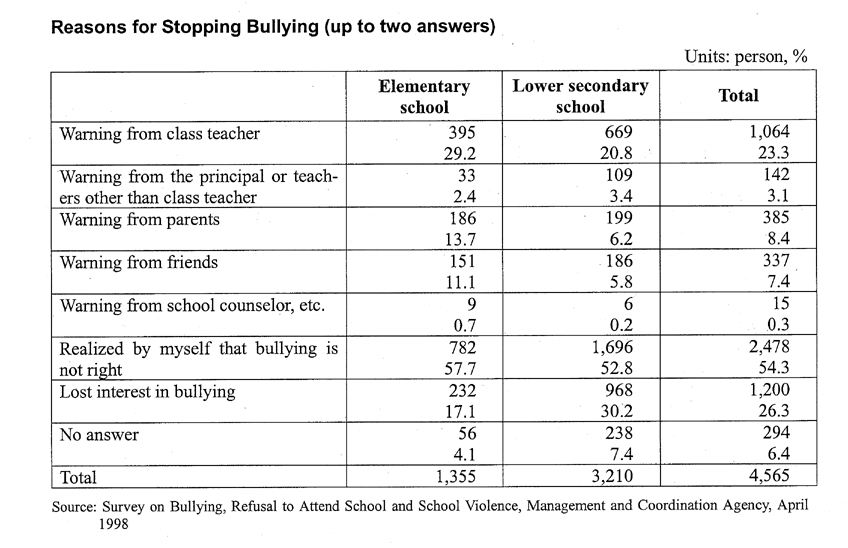| Home > Policy > White Paper, Notice, Announcement > White Paper > Japanese Government Policies in Education, Science, Sports and Culture1999 > Part2 Q9 | ||
A:The most important thing is for the mother and father to provide some sound advice,giving the child the courage to talk to a teacher,brothers and sisters or friends.
We believe that everyone thinks that bullying is unacceptable.However,in the real world bullying continues to occur,and while it has declined for three con-secutive years,there were still about36,000cases of bullying in Japan during FY1998.There are various factors involved in bullying,and according to one survey,a higher proportion of children who are bullies stop bullying when they are warned by an adult,such as a teacher or a parent,rather than by a friend.Therefore,when there is an accusation of bullying,it is important for an adult close-by to give advice immediately.In addition,teachers have a responsibility to address the problem of bullying in terms of pro-tecting by all means the children who could be bullied again because of informing teachers of bullies.Therefore,have the courage to consult the teacher.Further,in many schools in recent years,school counselors or advisers in the classroom for eas-ing children's minds have been appointed.Therefore,if you find it difficult to inform the teacher,you can try speaking to one of these counselors or advisers.The problem of bullying is a major issue in edu-cation.It is totally unacceptable behavior for a human being to bully people.It is important for all fathers,mothers and schools to teach this clearly to children.


-Outline of the interim report of the Survey on Enhancing Class Management(September1999) Recently,the phenomenon of"class disrup-tion"has been the subject of much discussion.While this phenomenon is by no means tak-ing place at a large number of schools,in February1999,the Ministry of Education,Science,Sports and Culture(MESSC)com-missioned the Class Management Research Committee(composed of researchers from the National Institute for Educational Re-search,outside researchers and schoolteach-ers)to perform research in order to gain a grasp of the actual situation of the phenome-non.The Research Committee conducted in-terviews with people involved in class man-agement in elementary schools all over the country and published its interim report in September1999.MESSC will conduct further research and consider specific measures. O Situation in Which Classes Are NotFunctioning Successfully 1)In this research,"class disruption"refersto"a situation in which a class is notfunctioning successfully."This meat's asituation in which group education,oneof the functions of school,is ineffectivein the classroom,where children behavedisruptively in ignorance of teacher's in-structions,and where the problem is notresolved by the class teacher using theusual methods.
2)The reasons why classes do not functionsuccessfully include problems with theteaching ability of the class teacher,problems with the measures of the school,changes in children's lives and humanrelations,and a lowering of the educa-tional strengths of the home and the localcommunity. 3)There is no simple cause-and-effect rela-tionship,but rather an accumulation ofcomplex factors.There is no specificremedy to solve the problem.The com-plex factors must be appropriately ad-dressed one by one. <>Strategies for Classes That Are Not Func-tioning Effectively One hundred and two cases are classified into the ten following categories,many of which can be applied to rnore than one category.Each category is followed by example strate-gies. Category1:Collaboration and coopera-tion with pre-school education is notenough(11classes) To organize classes in line with the actualcircumstances of children.
To promote collaboration and cooperationwith pre-school education,exchange thenecessary information. Category2:There are students who re-quire special,educational considerationand support(26classes)'s To take an accurate decision as to whetheror not educational consideration is required,establish a system for long-term measures
To organize classes that make use of thedifferences inherent in each and everychild. Category3:There are students who donot receive the necessary parenting athome(21classes) To gain a precise understanding of theeducational environment of children
To build collaborative and cooperative re-lationships with related institutions To build relationships of trust among chil-dren. Category4:There are students who aredissatisfied with the content and methodof classes(65classes) To implement flexible selection of teach-ing methods,implement a variety of de-vices,including expansion of in-schooltraining,team teaching and hands-on ac-tivities
To devise opportunities for discussion out-side of class times Category5:There is no adequate respon-se to bullying and other problematic be-havior(38classes) To address basic problems and respondsystematically to bullying,more specificallyto understand children's mentality and toresponding rapidly and appropriately.
Category6:The principaPs leadershipand collaboration and cooperation withinthe school are not established(30classes) To give due administrative considerationfor transferred teachers in areas such as theallocation of school duties
To ensure that the principal exert leader-ship in response to problem situations To promote the creation of an atmospherefor easy discussion amongst teaching staff. Category7:The teacher's classroomi,management lacks flexibility(74classes) To seek a common understanding of theproblem by exchanging information amongclasses
To consider appropriate school personnelin order to increase the teaching abilities ofclass teachers. Category8:Lack of trust between theschool and home has been caused by in-adequate dialogue between both(27casses) To fulfill the school's duty to provide in-formation,unite to solve problems bycommunicating with parents and sharinginformation
To promote cooperation with the localcommunity and board of education. Category9:Research and practicalachievements of teachers are not appliedthroughout the school(16classes) To work to enhance the system of schoolorganization
To design teaching and learning systems,such as using team teaching in classes,andto study them together. Category10:There are problems withdiscipline at home and the response of theschool(14classes) To find out about the child raising prac-tices of parents and respond appropriately To promote the creation of a cooperativerelationship between the school and thecommunity To work for a rapid response and flexibleschool management |
| Back to Top | MEXT HOME |